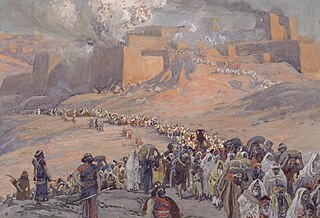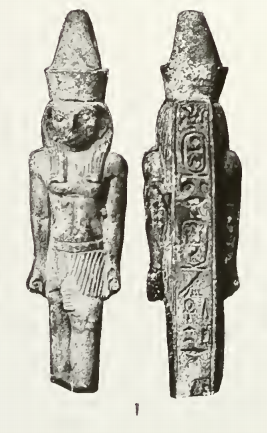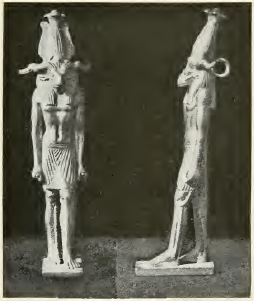
The book of Obadiah is a book of the Bible whose authorship is attributed to Obadiah, a prophet who lived in the Assyrian Period. Obadiah is one of the Twelve Minor Prophets in the final section of Nevi'im, the second main division of the Hebrew Bible. The text consists of a single chapter, divided into 21 verses, making it the shortest book in the Hebrew Bible. The book concerns the divine judgment of Edom and the restoration of Israel.

Yahweh was an ancient Levantine deity that emerged as a "divine warrior" worshipped first in Edom, and later in Canaan as the national god of ancient Israelites and Judahites. The origins of his worship reach at least to the early Iron Age, and likely to the Late Bronze Age if not somewhat earlier.

The Babylonian captivity or Babylonian exile is the period in Jewish history during which a large number of Judeans from the ancient Kingdom of Judah were captives in Babylon, the capital city of the Neo-Babylonian Empire, following their defeat in the Jewish–Babylonian War and the destruction of Solomon's Temple in Jerusalem. The event is described in the Hebrew Bible, and its historicity is supported by archaeological and extra-biblical evidence.
Herod I, also known as Herod the Great, was a Roman Jewish client king of Judea, referred to as the Herodian kingdom. He is known for his colossal building projects throughout Judea, including his renovation of the Second Temple in Jerusalem and the expansion of the Temple Mount towards its north, the enclosure around the Cave of the Patriarchs in Hebron, the construction of the port at Caesarea Maritima, the fortress at Masada, and Herodium. Vital details of his life are recorded in the works of the 1st century CE Roman–Jewish historian Josephus.

The Hasmonean dynasty was a ruling dynasty of Judea and surrounding regions during classical antiquity, from c. 140 BCE to 37 BCE. Between c. 140 and c. 116 BCE the dynasty ruled Judea semi-autonomously in the Seleucid Empire, and from roughly 110 BCE, with the empire disintegrating, Judea gained further autonomy and expanded into the neighboring regions of Perea, Samaria, Idumea, Galilee, and Iturea. The Hasmonean rulers took the Greek title basileus. Forces of the Roman Republic conquered the Hasmonean kingdom in 63 BCE and made it into a client state; Herod the Great displaced the last reigning Hasmonean client-ruler in 37 BCE.
Israel is a country in Western Asia.

The Sahara is a desert on the African continent. With an area of 9,200,000 square kilometres (3,600,000 sq mi), it is the largest hot desert in the world and the third-largest desert overall, smaller only than the deserts of Antarctica and the northern Arctic.
Yohanan, Yochanan and Johanan are various transliterations to the Latin alphabet of the Hebrew male given name יוֹחָנָן, a shortened form of יְהוֹחָנָן, meaning "YHWH is gracious".

Menkheperre Necho I was a ruler of the ancient Egyptian city of Sais. He was the first securely attested local Saite king of the 26th Dynasty of Egypt who reigned for 8 years (672–664 BCE) according to Manetho's Aegyptiaca. Egypt was reunified by his son Psamtik I.
Petiese was the name of a number of high ancient Egyptian officials who served the pharaohs during the seventh and sixth centuries BCE. Their family history is known from a petition, which the priest Petiese wrote during the reign of Darius I of Persia, although some have claimed that, rather than a real petition, this is a work of literature or at best a draft for a petition.
The ancient Egyptian known as Pediese, married to the great-great-granddaughter of Shoshenq III, was one of a number of princes ruling Lower Egypt towards the end of the eighth century BCE. He was of Libyan descent, a chief of the Ma. After Piye conquered Memphis, Pediese surrendered his residence Athribis and may well have been instrumental in bringing about the surrender of most of the other chiefs and kings ruling the Nile Delta.
Johanan, son of Joiada, was the fifth high priest after the rebuilding of the temple in Jerusalem by the Jews who had returned from the Babylonian captivity. His reign is estimated to have been from c. 410–371 BCE; he was succeeded by his son Jaddua. The Bible gives no details about his life. Johanan lived during the reigns of king Darius II of Persia and his son Artaxerxes II, whose Achaemenid Empire included Judah as a province.
The Kingdom of Israel may refer to any of the historical kingdoms of ancient Israel, including:

Peftjauawybast or Peftjaubast was an ancient Egyptian ruler ("king") of Herakleopolis Magna during the 25th Dynasty.
This page is based on this
Wikipedia article Text is available under the
CC BY-SA 4.0 license; additional terms may apply.
Images, videos and audio are available under their respective licenses.






